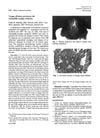7 citations,
August 2020 in “Genes” Different genes are active in dogs' hair growth and skin, similar to humans, which helps understand dog skin and hair diseases and can relate to human conditions.
 7 citations,
September 2021 in “Anais Brasileiros De Dermatologia”
7 citations,
September 2021 in “Anais Brasileiros De Dermatologia” COVID-19 can cause temporary hair loss, often starting around 7-8 weeks after recovery, with factors like Vitamin D deficiency, other diseases, medication, and stress potentially contributing.
 7 citations,
June 2021 in “JAAD Case Reports”
7 citations,
June 2021 in “JAAD Case Reports” A woman had hair loss, nail changes, and skin peeling after a COVID-19 infection, which got better on their own.
 7 citations,
April 2021 in “Journal of The American Academy of Dermatology”
7 citations,
April 2021 in “Journal of The American Academy of Dermatology” Hair loss (telogen effluvium) cases rose during the pandemic, especially in Hispanic and non-White groups, and were linked to other health issues and COVID-19.
 7 citations,
January 2015 in “Journal of the European Academy of Dermatology and Venereology”
7 citations,
January 2015 in “Journal of the European Academy of Dermatology and Venereology” Only about 20% of women have hair loss after childbirth severe enough to be considered clinically significant.
 7 citations,
January 1998 in “PubMed”
7 citations,
January 1998 in “PubMed” Hair loss can cause scalp discomfort.
6 citations,
April 2022 in “Journal of The American Academy of Dermatology” Low-dose oral minoxidil improved hair growth in most pediatric patients with mild side effects.
6 citations,
June 2021 in “EClinicalMedicine” ALRV5XR significantly improves hair density in women with hair loss and is well-tolerated.
 6 citations,
January 2021 in “Journal of Cosmetic Dermatology”
6 citations,
January 2021 in “Journal of Cosmetic Dermatology” Poor sleep during the pandemic may increase stress and worsen hair loss conditions.
 6 citations,
January 2021 in “Journal of Nutritional Science and Vitaminology”
6 citations,
January 2021 in “Journal of Nutritional Science and Vitaminology” Taking vitamin D3 pills helped improve hair growth in women with a certain type of hair loss.
 6 citations,
January 2018 in “PubMed”
6 citations,
January 2018 in “PubMed” Heavy metals might contribute to hair loss in Telogen Effluvium.
 6 citations,
November 2013 in “International Journal of Radiation Biology”
6 citations,
November 2013 in “International Journal of Radiation Biology” Gamma-rays exposure during the resting phase of hair growth can damage hair regeneration and color in mice.
 6 citations,
January 2012 in “Springer eBooks”
6 citations,
January 2012 in “Springer eBooks” Trichoscopy is not specific for diagnosing telogen effluvium and both telogen effluvium and androgenetic alopecia often occur together.
5 citations,
March 2022 in “Frontiers in Cell and Developmental Biology” Colostrum-derived exosomes can promote hair growth and may be a promising treatment for hair loss.
 5 citations,
December 2021 in “Journal of Cosmetic Dermatology”
5 citations,
December 2021 in “Journal of Cosmetic Dermatology” QR678 Neo® hair growth treatment is effective for hair loss caused by Covid-19.
5 citations,
August 2019 in “Anais Brasileiros De Dermatologia”  5 citations,
January 2019 in “Giornale italiano di dermatologia e venereologia”
5 citations,
January 2019 in “Giornale italiano di dermatologia e venereologia” Hair loss can happen after a fever caused by Rickettsia conorii infection.
 5 citations,
March 2017 in “Biomedical and Pharmacology Journal”
5 citations,
March 2017 in “Biomedical and Pharmacology Journal” Certain growth factors significantly affect hair loss in women with telogen effluvium.
 5 citations,
August 2015 in “Bioscience, Biotechnology, and Biochemistry”
5 citations,
August 2015 in “Bioscience, Biotechnology, and Biochemistry” Obese mice with a leptin gene mutation have a longer resting phase in their hair cycle, which may help understand certain hair loss conditions.
 5 citations,
February 2014 in “PubMed”
5 citations,
February 2014 in “PubMed” Hair loss in Telogen effluvium is often chronic, linked to stress, and lacks a confirmed treatment, but topical corticosteroids may be used.
 5 citations,
March 2012 in “Clinical and Experimental Dermatology”
5 citations,
March 2012 in “Clinical and Experimental Dermatology” A woman experienced temporary hair loss after taking albendazole, which resolved on its own within 3 months.
 5 citations,
April 2002 in “The American Journal of Medicine”
5 citations,
April 2002 in “The American Journal of Medicine” Hair loss can be an early sign of HIV infection.
 5 citations,
July 1991 in “Journal of The American Academy of Dermatology”
5 citations,
July 1991 in “Journal of The American Academy of Dermatology” Hair loss in a woman with eosinophilia-myalgia syndrome improved after stopping L-tryptophan and starting treatment.
 4 citations,
March 2023 in “Journal of the European Academy of Dermatology and Venereology”
4 citations,
March 2023 in “Journal of the European Academy of Dermatology and Venereology” COVID-19 can cause a temporary hair loss condition.
 4 citations,
October 2022 in “Journal of family medicine and primary care”
4 citations,
October 2022 in “Journal of family medicine and primary care” Some people in Saudi Arabia experienced hair loss after the COVID-19 vaccine, more often in women and those without prior hair loss.
 4 citations,
April 2022 in “Dermatologic Therapy”
4 citations,
April 2022 in “Dermatologic Therapy” Injecting scalp tissue micrografts is a safe and effective treatment for hair loss after COVID-19.
 4 citations,
February 2022 in “Journal of Cosmetic Dermatology”
4 citations,
February 2022 in “Journal of Cosmetic Dermatology” Monocytes might be linked to hair loss after COVID-19.
 4 citations,
January 2022 in “Indian Dermatology Online Journal”
4 citations,
January 2022 in “Indian Dermatology Online Journal” COVID-19 may cause temporary hair loss due to direct damage to hair follicles, but it usually gets better on its own.
 4 citations,
March 2021 in “International Journal of Dermatology”
4 citations,
March 2021 in “International Journal of Dermatology” COVID-19 and related stress may increase hair loss known as Telogen effluvium.
 4 citations,
June 2016 in “Rossiiskii Zhurnal Kozhnykh i Venericheskikh Boleznei”
4 citations,
June 2016 in “Rossiiskii Zhurnal Kozhnykh i Venericheskikh Boleznei” Combining iron supplements with Qilib lotion is more effective for treating hair loss from iron deficiency.
























